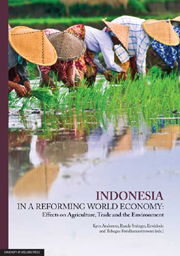Book contents
- Frontmatter
- Contents
- List of tables, figures and boxes
- FIGURES
- Acronyms
- Preface
- List of contributors
- 1 Introduction
- 2 Effects of growth, its interruption, and the Uruguay Round on Indonesian agriculture
- 3 Effects of AFTA and APEC trade policy reforms on Indonesian agriculture
- 4 Trade liberalisation and soil degradation in Indonesia
- 5 Will the Uruguay Round and APEC reforms harm air and water quality in Indonesia?
- 6 Impacts of agricultural protection growth at home and the WTO's Doha Round on Indonesian agriculture
- 7 Effects of agricultural policy reform on household and regional income distribution in Indonesia
- 8 Effects of farm policy reform on Indonesia's secondary food crops
- 9 Effects of agricultural policy reform in Indonesia on its food security and environment
- 10 Impacts of trade policy reform on income distribution and poverty in Indonesia
- APPENDIX 1 The WAYANG Model of the Indonesian economy
- APPENDIX 2 The GTAP Model and database
4 - Trade liberalisation and soil degradation in Indonesia
Published online by Cambridge University Press: 05 June 2012
- Frontmatter
- Contents
- List of tables, figures and boxes
- FIGURES
- Acronyms
- Preface
- List of contributors
- 1 Introduction
- 2 Effects of growth, its interruption, and the Uruguay Round on Indonesian agriculture
- 3 Effects of AFTA and APEC trade policy reforms on Indonesian agriculture
- 4 Trade liberalisation and soil degradation in Indonesia
- 5 Will the Uruguay Round and APEC reforms harm air and water quality in Indonesia?
- 6 Impacts of agricultural protection growth at home and the WTO's Doha Round on Indonesian agriculture
- 7 Effects of agricultural policy reform on household and regional income distribution in Indonesia
- 8 Effects of farm policy reform on Indonesia's secondary food crops
- 9 Effects of agricultural policy reform in Indonesia on its food security and environment
- 10 Impacts of trade policy reform on income distribution and poverty in Indonesia
- APPENDIX 1 The WAYANG Model of the Indonesian economy
- APPENDIX 2 The GTAP Model and database
Summary
This chapter extends the Global Trade Analysis Project (GTAP) model to include the effects of land degradation for the Indonesian economy. For Indonesia, soil erosion appears to be one of the most significant environmental problems caused by agricultural production. We simulate the off-site environmental damage and onsite productivity impacts of erosion, along with the standard intersectoral and interregional economic effects of trade liberalisation. We then analyse the welfare implications of trade policy changes where soil erosion occurs and land productivity is reduced.
Land degradation may have significant adverse effects, particularly in developing countries (Scherr and Yadav 1996; Rosegrant and Ringler 1997). For example, in countries such as Costa Rica, Malawi, Mali and Mexico, soil erosion is estimated to cause national economic losses of between 0.5 and 1.5 percent of annual GDP (World Bank 1992a). Countries with fragile tropical land are particularly problematic, and rural poverty in developing countries may force people with no other options to exploit available resources beyond their sustainable capacity (Pinstrup-Anderson and Pandya-Lorch 1994).
Indonesia also appears to suffer significant negative effects from land degradation, with World Bank estimates suggesting that soil erosion on Java costs the economy US$340-406 million per year in 1989 dollars (Magrath and Arens 1989). Of this, nearly 80 percent is due to declines in the productivity of agricultural land. The other 20 percent or so is due to off-site costs such as siltation of irrigation systems and the loss of reservoir capacity.
- Type
- Chapter
- Information
- Indonesia in a Reforming World EconomyEffects on Agriculture, Trade and the Environment, pp. 40 - 60Publisher: The University of Adelaide PressPrint publication year: 2009
- 1
- Cited by



